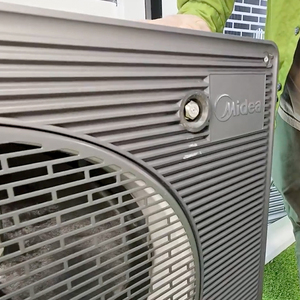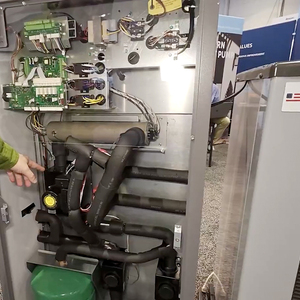I have the opportunity to purchase a diesel generator. The output is 240/416 3ph 400Hz and 120/204 3ph 400Hz. I know I can drop the 3ph down to 1ph for the house, but my question is…what is the difference between the regular household frequency of 60Hz and the generator output at 400Hz? I figure it makes a difference, but don’t know how. Can you all help me out?
Thanks!



















Replies
Your clocks are going to run real fast
Most AC devices get their speed from the frequency of the signal, so everything with a motor is going to run about 7 times faster. Your lights are now going to flash 7 times faster. I am sure that others will know more than I, but this doesn't sound good at all.
This is unusable in it's present state. You could ask a motor shop what they can do with the generator head (swap it out or rewind it). The engine is the only valuable part at this time.
6 diodes at about $14 ea gives you 270 Vdc.
a 270VDC to 120vac 60 Hz costs about $50 per kw - see if you cand find an inverter.
HOwever, even needing to ask the question means you will need to likely hire somebody for big $$ to hook it up???
Do yu know how to wire a 6 ple 3 phase bridge?
Just about anything you have that is modern electronics will run fine on 120 vac 400 hz,
BUT - yur motors will run at 10,000 rpm or more on 400 Hz though and soon burn up. (<10 minutes) -- eg. fridge, furnance fan, dishwasher, freezer, air compressor,
your universal motor tools (drill, shop vac, vacuum cleaner, skilsaw, etc.) will run OK on 400 hz but a bit hotter.
400 Hz can be used to power standard lightbulbs (not fluorescent), and simple resistance heaters (eg, toasters, space heaters) that do not have electronic controls. It won't (safely/effectively) power any sort of motor, device with a transformer or ballast, or device containing complex electronics.
It won't (safely/effectively) power any sort of........ device containing complex electronics.
ya wanna rethink that comment?
actually have a 400Hz generator at home, would not hesitate to plug any of my own electronics that do not include an induction motor into it.
any fluorescent light with an electronic ballast will run just fine also.
however, would not expect original poster to know ow to check for that.
The power supplies of most electronic devices are "tuned" to 50/60 Hz. You are right that it likely so happens that many of these would, somewhat by accident, function OK on 400 Hz, but I woudn't want to bet a piece of equipment worth several thou on this accident being true.
In particular, any device containing a line voltage transformer is likely to malfunction (if it isn't, in fact, damaged). Devices with switching power supplies would PROBABLY be OK, but you never know when the designer may have, eg, used the 60 Hz to "clock" some part of the logic.
""any device containing a
""any device containing a line voltage transformer is likely to malfunction (if it isn't, in fact, damaged). ""
Please 'educate' me regarding that comment.. I want to learn, so airplanes with lots of 400 Hz equipment dont fall out of the sky. Remember, we are discussing the limited case of plugging a xfmr designed for 50-60 Hz, 120 Vac into 120 Vac, 400 Hz.
recall that V=N*B*A*w
So, any core for 60 Hz 120 Vac will see less than 2.7kG flux density, zero chance of satruation.
Granted, core losses are a power function (cube in some cases) of frequency, but also an inverse power function of flux density (square or cube, depending on material, lamination thickness, etc.)
For a typical 60 Hz xfmr with 12 mil silicon iron, the core losses are only 1/2 at 400 Hz vs. 60 Hz assuming a 60 Hz designed xfmr plugged into 400 Hz. The xfmr is more efficient at 400 Hz.
Unless you get to big whomping 100 kVA, skin effect on copper is negligible.
PD damage is zero for 120 Vac to chassis in either case.
Tell me what I'm missing, or do you just spout out some of your replies without thinking about them or without a complete knowledge base ? Bill stays away these days, so somebody needs to cut down on the BS inaccuracies. <G>
The transformer coils are more efficient at 400 Hz. The core isn't. The typical 60 Hz laminated core will overheat at 400 Hz, due to hysteresis loses. At the higher frequency you need thinner laminations, or some other material.
No, you are not considering all factors or are simply not aware of how transformers are designed. .
You need to go read some core material specifications and basic physics. Core losses (watts heating) for a xfmr designed for 60 Hz will be approx 1/2 level that when run at 400 Hz. Remember; flux density = volts / (core area* number of turns*radian frequency; in SI units naturally)
Then look up core losses for 2.7 kG at 400 Hz vs 18 kG at 60 Hz for silectron or any other material and compare ....
At the higher frequency you need thinner laminations -- true if you are trying to run the core at near saturation levels, not if the core is at 1/7 of the design flux density as it is for a 60 Hz xfmr pluggedd into 400 Hz.
Every once in awhile you seem 'to just shoot from the hip' in reflex responses or something - engineering is not like liberal politics, where you can just wish something were true even though it is not ?? Have you ever actually run any power circuits at 400 Hz?
Also, due to slight skin and proximity effects at 400Hz, transformer COILs are Less efficient (very slightly higher losses) at 400 Hz everything else being equal.
The thickness of the laminations doesn't have that much to do with saturation -- eddy currents can form at any level of saturation.
Of course, eddy currents form anytime there is any magnetic field and a conductor
However, Please read the following link on the relationship between eddy currents and flux density.
http://en.wikipedia.org/wiki/Eddy_current
In the equations provided there, you will notice that B and f are both square functions. The BF product is thus the same for 60 and 400 Hz, so eddy current losses remain constant for the case we are considering.
Hysterysis losses - need those need to be explained also.
Lessons finished for the day...
Thank you
for the lessons gentlemen. You are quite correct that I would be hiring someone for big $$$ to convert and hook the beast up for me. So this "opportunity" will just have to pass.
Youse guys did
and helped me out!
This thread ought to be posted and framed, required reading for anyone who wants a generator.
"I have an opportunity to purchase ...." is the opening line of the classic generator tragedy story. In no other area -not even cheap used cars- can I more stronglt make the point that you ought not buy someone else's troubles.
Generators are quite specific for their application. Almost like buying shoes- the wrong size or style and you're made very unhappy, very fast.
Even when the generator is suitable for the application, it's critical that it be maintained and operated regularly. Associated equipment -the sound package, the transfer switch, etc.- is essential. Buying a generator without them is like buying shoes without laces.
Generators seem quite the fad these days. Yet, most folks NEED a generator as much as a fish needs a bicycle. Power interruptions? So what? Only a century ago, most homes were completely without electricity. Most of the gizmos we use had yet to be invented.
A century ago your pump had a handle on it and you didn't have a freezer full of food.
I think one's position on this should be based on the credibility and track record of one's local poco. We live in the boonies, and it gets good and cold here, but in ten years the longest power outage we've had is about three hours.
Hence, I've got a 5kw genset that will power the well pump or a few lights and appliances. The wood stove is our usual source of heat anyway.
If the poco's track record had multi-day or week outages I would have preprared differently.
The ice storm that hit Ky last year was real wake up call for many here. Prior to that we were hit with the rements of the Ike hurricane. Ike was a warm weather event and even with 2000+ workers restoring service it was a two week ordeal, The ice storm sent thousands of people to shelters and even with 3500+ people working it took almost a month to restore.
I worked the first two weeks of the ice storm 24/7 and the last two weeks on 16 hr shifts. My family had no power except a small 2Kw portable generator for ten days. That was eneough to keep the refrigerators and a few lights on. heat was one wood burning stove and that only kept things habitable in the family room and kichen of the inlaws house.
The county emergency shelter was only large enough for 60 people. that was the FEMA/Homeland Security approved plan and no amount of common sense could change it. We had two schools that did not loose power and could have easily handled the 200 people that were seeking shelter. The same senerio played out in counties throughout KY. Fortunately most municiple governments stepped in and found shelters on thier own because the Feds failed miserably.
It was an extremely frustrating time for those of us working the storm. our families were at risk and we could do nothing specically for them because we had thousands to try to get power to.
That was a wake up call for me. I won't be caught like that agian.
The problem is, in most areas of the country you only see an event like that maybe once every 20 years. The cost to purchase, install, and maintain a large generator that's used once every 20 years swamps the expenses associated with a single event.
A 17Kw Generac generator at HD is $3499 and includes the transfer switch. NG or propane.
My price is a little better and I'll install it myself. I use propane for my shop and DW studio for heat so the tank is already there.
All in all it is cheaper than most good used cars. I'm on a rural electric service and over the last 8 years we have had to use a portable generator at least 5 times for three or more days. Fortunately all but the ice storm occured in mild weather so the inconvienience was minor.
Durring the windstorm and ice storm we were scrambling to furnish very large generators to many municipalities. We lost transmission tower as well as distribution poles,transformers and such. Like most utilities nationwide we don't keep a large enventory of those items on hand, so it takes longer to restore service than it did say 20 years ago. That is also the reason utilities pool thier physical and manpower resources durring major events.
One of the funny things that occurred durring the 08 windstorm was a critical fuel shortage durrin the first three days. the fuel treminals lost power and did not have adequate emergency generators to load out fuel trucks. Hundreds of gas stations and service marts were also without power. There was plenty of fuel in tanks. Just no way to pump it. By day three we were having fuel trucked in from outside the damaged area, just to keep the several hundred vehicles ours and our co- utilities fleets in service.
I 've seen way to many 20 and 100 year events occure in the last 25 years working for a utlity company to have much faith in the statistic or averages. $3500 is cheap insurance over the next 25 years.
It's one thing if you can have a three day event every year or two. But many buying the fancy units rarely are out of power for more than 15 minutes twice a year (if even that). When you consider that a unit that's been sitting untested/unserviced for 2-3 years is apt to be useless, and when you consider that many people don't even change the oil in their cars on any sort of decent interval, for most people a standby generator is a waste of money (if not outright dangerous).
Generators seem quite the fad these days. Yet, most folks NEED a generator as much as a fish needs a bicycle. Power interruptions? So what? Only a century ago, most homes were completely without electricity. Most of the gizmos we use had yet to be invented
That statement is a littel over the top.
So you are saying just tough it out for a week or more while the utility repairs downed lines and restores your power?
Most home today don't have auxillary heat, root cellars and coal oil lanterns. Without backup power you may as well back your family up and go to the closest shelter,...then hope you get there early enough to not be turned away and sent somewhere else.
Of course when you do get back to your home you will have plenty to survive on in the way of non-parishable food you stocked for just such emergencies.
As a society we have proven we are not prepared to atke care of very large numbers og people that need shelter and care durring natural disasters. FEMA has blown it everytime they have been called on.
I'll count on me to take care of my family, immediate and extented. That is why I'm building with an 18K kw generator in the budget.
Generators
Power interruptions? So what?
So: your food doesn't spoil
So: your security system works
So: your basement doesn't have a foot of water in it, ruining everything
So: you can continue with your life for 30 hours (like we did) in the last storm (March 2010) while your neighbors are going down to see FEMA for help.
After 3 years I'd say someone would have to pry our Generac 16KW out of my cold lifeless hands ;o)
<eta - So: you can run your NEIGHBOR'S sump pump as well, with 300' of HD extension cord>
Perhaps you're right, but that windstorm from hurricane Ike took my power down for almost a week. I have a 5hp 1850 watt old generator that cost me $75 used. Problem was no gas anywhere, but I had enough in the vehicles to get by.
I had a fan, nice bright lights, cold food, a microwave, tv reception, etc. Fortunately that was all I required, but I could have had heat if it was winter, or maybe a small airconditioner if it was deathly hot.
I'm glad to have that little guy, and have considered getting a small size stationary natural gas unit installed.
Also there was a guy on tv that had to have electrical power for medical reasons or he would have died. A neighbor ran a cord to his machine, the man was crying and saying how thankful he was to have a neighbor like that. Of course the neighbor said he wasn't a hero, just a guy that spared a little power to a neighbor in need.
I don't care if it is only $100 worth of food. My family MIGHT want to eat something in five days. Why not eat what's in the freezer being kept cold by a generator? Our generation does not "home can", we freeze. Go out to eat? Typically impractical in ice storms for the first few days. Also, when hurricane Isabel rolled through the city of Richmond, it was hard to eat out since there was almost a city wide loss of power and therefore WATER service! We went there to deliver a generator to my dad as we had an extra, and some more fuel. Finally found a restaurant open about 8 miles out of town.
Even people living and working in downtown Richmond were without power for a week! Now that may never happen again... But, this is only the mild effect of Isabel, just ask people living between Richmond and the Atlantic ocean how long their power was off, including the cities of Norfolk, Williamsburg and VA Beach.
Water in the basement is a problem if you do not live on a sloping lot where you can perimeter drain to daylight. Most of the systems in this area drain the underslab and perimeter to a sump pump. No power, water is comming in. Or you don't build a basement. I have a sloping lot, a requirement of mine when lot shopping, so I don't have the problem. But any house with an outside stairwell accessing the basement must pump up, as it is illegal now to dump that water into the sewer, or daylight drain. Remember, hurricane means loss of power when there is lots of water to deal with. No small summer shower here.
The other water concern here is we are on a well, one without a handle for pumping! It is nice to flush toilets. Even nicer to take a hot shower after clearing the driveway and cutting up trees. But that is not a necessity.
Heat is also real handy in the winter to keep the people and pipes from freezing.
But I highly agree location, location, location will determine if a generator will ever really be used, or be ready to use if the occasion arises. It is not a one size fits all solution for the average person. But hey, who here is average?
Frank DuVal
folks NEED a generator
You BET. The question is how many.
I only got 6*, 12kW, 4kW, 3.5kW, 1500W, 1.2kW, and a 4kW 400 Hz. ... looking to find another at a garage sale this summer.
Never can have too many of a good thing. Only one I did not use last year was the 400 Hz.
*Well actually 7, if you count the 800Adc Lincoln welder on V4 wisconsin engine.
Basement is fixed
There are areas like ours (boulder fields/terminal moraine/high bedrock) where even a 'fixed' basement can be overwhelmed by groundwater in extreme conditions (Hurrican Floyd for example - we got 8" rain in 8 hours). It's a house, not a boat. House nearby had $100,000 + damage in basement flooded to 2' ... several houses had basements flooded to 6'. I prefer Generac to FEMA thank you very much!
I never understood the basement thing. Even when I was in Maryland, where basements were the norm, I insisted that the house I bought/built had a grade level walk out so water could not accumulate. As predicted, I never had a water problem. Everyone I know with a basement has had a water problem of one kind or another.
Here in Florida, therre are no basements and I don't miss it.
Florida, generally, has sandy soil that drains well.
Our house has an 18th century stone foundation and it was built, literally, inside a 'bowl' of diabase bedrock. This diabase, which the excavators around here call 'blue jingle' because the quarries (somehow!) manage to crush it into gravel for drainage coursing and it's so frickin' hard it actually 'jingles' one stone against the next.
So picture your house sitting inside a cereal bowl, with a network of mission-critical sump pumps to take care of any 'fill-ups' in the bowl. Leaders all drain to daylight just over the edge of the bowl so they're not a problem.
Basement is fixed
There are areas like ours (boulder fields/terminal moraine/high bedrock) where even a 'fixed' basement can be overwhelmed by groundwater in extreme conditions (Hurrican Floyd for example - we got 8" rain in 8 hours). It's a house, not a boat. House nearby had $100,000 + damage in basement flooded to 2' ... several houses had basements flooded to 6'. I prefer Generac to FEMA thank you very much!
Out in the country
is a special case, as you mentioned.
Water is supplied by a well and the tank will provide a days worth if rationed. Modern water heaters, furnaces and boilers, all require electric power to operate. In the midwest, power is more likeley to be lost for an extended period of time due to winter storms, when heat is necessary. I do not have a generator, I do live out in the country and I have lost power for several days on many occassions, probably on the average of about once every two years. Usually, two to three days at a time, sometimes more.
If I stayed at a hotel in town every time it happened, the cost of small generator would have easily been worth it. Otherwise, the frequency and consequences are not that sever, in my circumstance. BUT, I would still love to have one.